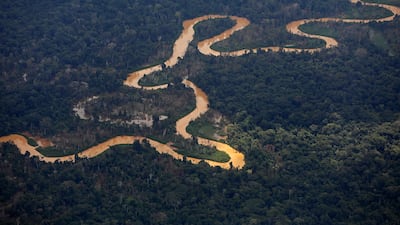Which is the longest river in the world? The Nile or the Amazon? The question has fuelled a heated debate for years. Now, an expedition into the South American jungle aims to settle it for good.
Using boats that run on solar energy and pedal power, an international team of explorers plan to set off next April to the source of the Amazon in the Peruvian Andes, then travel about 7,000kms across Colombia and Brazil, to the massive river's mouth in the Atlantic.
“The main objective is to map the river and document the biodiversity” of the surrounding ecosystems, said Brazilian explorer and project co-ordinator, Yuri Sanada.
The team also plans to make a documentary on the expedition.
Where does the Amazon River begin and end?
About 10 people are known to have travelled the full length of the Amazon, but none have done it with those objectives, said Sanada, who runs film production company Aventuras (Adventures) with his wife, Vera.
The Amazon, the pulsing aorta of the world's biggest rainforest, has long been recognised as the largest river in the world by volume, discharging more than the Nile, the Yangtze and the Mississippi combined.
But there is a decades-old geographical dispute over whether it is longer than the Nile, made murkier by methodological issues and a lack of consensus on a rather basic question – where does the Amazon start and end?
The Guinness Book of World Records awards the title to the African river. However, it adds in a note: “Which is the longer is more a matter of definition than simple measurement.”

The Encyclopedia Britannica gives the length of the Nile as 6,650km, and 6,400km for the Amazon, measuring the latter from the headwaters of the Apurimac river in southern Peru. In 2014, US neuroscientist and explorer James “Rocky” Contos developed an alternative theory, putting the source of the Amazon farther away, at the Mantaro river in northern Peru.
If accepted, it would mean the Amazon “is actually 77km longer than what geographers had thought previously”, said Contos, who will guide one group in Sanada's expedition, which will trace both the Apurimac and Mantaro sources.
The river less travelled

Contos's group will travel down the Mantaro by white-water rafting. The other will travel the banks of the Apurimac on horseback with French explorer Celine Cousteau, granddaughter of legendary oceanographer Jacques Cousteau.
At the point where the rivers converge, Sanada and two other explorers will embark on the longest leg of the journey, travelling in three custom-made, motorised canoes powered by solar panels and pedals, equipped with a sensor to measure distance.
“We'll be able to make a much more precise measurement,” Sanada said, adding the explorers plan to transfer the sustainable motor technology to local Indigenous groups.
The expedition is backed by international groups including The Explorers Club and the Harvard map collection.
The adventurers will traverse terrain inhabited by anacondas, alligators and jaguars, but none of that scares Sanada, who said: “I'm most afraid of drug traffickers and illegal miners.”
Each boat will be outfitted with a bulletproof cabin, and the team is negotiating with authorities to obtain an armed escort for the most dangerous zones.
If the expedition is successful, it may be replicated on the Nile.
Sanada said the debate on the world's longest river may never be settled, but he is glad the “race” is drawing attention to the Amazon rainforest's natural riches and the need to protect it as one of the planet's key buffers against climate change.
“The Amazon is [here], but the consequences of destroying it and the duty to preserve it are everyone's.”

